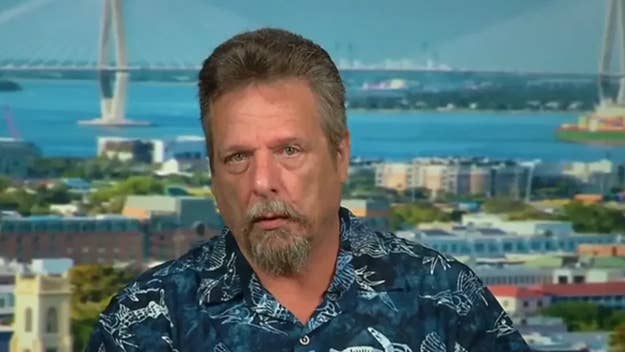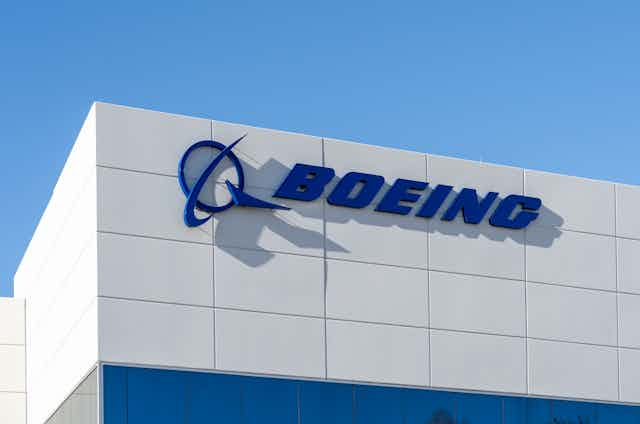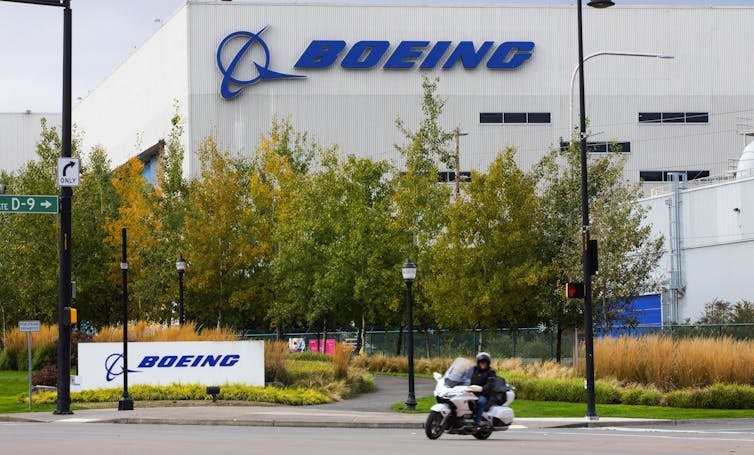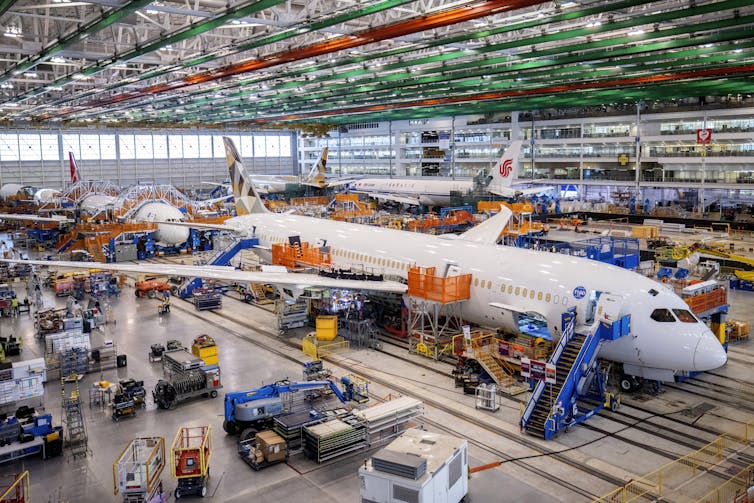1). “The suspicious 'suicide' of Boeing whistleblower John Barnett”, Mar 18, 2024, Bryan Dyne, World Socialist Web Site (WSWS), at < https://www.wsws.org/en/
2). “Boeing Whistleblower Predicts His Own Death: 'If Anything Happens to Me, It's Not Suicide': Barnett was found dead in his truck with a 'self-inflicted' gunshot wound”, Mar 15, 2024, Mark Elibert, Complex, at < https://www.complex.com/life/
3). “What the Boeing whistleblower’s death reveals about exposing corporate wrongdoing in North America”, Mar 17, 2024, Thomas Stuart & Douglas A. Stuart, The Conversation, at < https://theconversation.com/
4). “Boeing Whistleblower Found Dead in the US | Vantage with Palki Sharma”, Mar 13, 2024, Palki Sharma, FirstPost, duration of video 6:45, at < https://www.youtube.com/watch?
~~ recommended by dmorista ~~
Introductionby dmorista: The suspicious death of Boeing WhistleBlower John Barnett shows once again the ruthless nature of Capitalism. In Item 1)., “The suspicious 'suicide' of ….”, the author notes just a few other “questionable deaths”:
“Journalist Michael Hastings was found dead after crashing into a tree at 100 miles per hour while investigating then-CIA Director John Brennan. His last story, 'Why Democrats Love to Spy On Americans,' was published by BuzzFeed on June 7, 2013, 11 days before he died.
“Democratic Party staffer Seth Rich, thought to be behind the leak of 20,000 emails from the Democratic National Committee showing extraordinary corruption in favor of Hillary Clinton’s campaign, was shot in an apparent mugging in June 2016.
“Financier and sex-trafficker Jeffrey Epstein was found dead in his jail cell in August 2019 after investigations into his business threatened to reveal sordid connections to high level executives and politicians in the US and around the world.
“In every case, a story is worked out by the corporate media that is politically palatable for the bourgeoisie: car crash, robbery gone wrong, suicide by hanging. There is no serious investigation or follow-up, whether by the police or those purporting to call themselves 'journalists'.” (Emphasis added).
And these three political murders are just a tiny representation of the number of people who are killed by thugs working for the ruling class. The rulers first try to offer a sinecure to dissidents, if they are not willing to be bought off that way then the general rule is to smear them and end their effectiveness through complex convoluted legal operations. It that does not work the next step is to prosecute them with trumped up charges and lock them up for long prison terms. Finally if the other methods don't do the job they are killed. For example, Richard Belzer (who appeared as one of the regular characters in the TV Series Homicide Life on the Street, and in Law & Order: Special Victims Unit) discussed 50 mysterious killings of witnesses, honest police, and other inconvenient witnesses in his book Hit List, written with jounalist David Wayne. And that number does not include all the people killed to silence them after the JFK Assassination and cover-up.
Item 2)., “Boeing Whistleblower Predicts ….”, quotes a personal friend of Barnett's who told a reporter that he told her: “ …. 'No, I ain't scared, but if anything happens to me, it's not suicide.' ” In Item 3)., “What the Boeing whistleblower’s death ….”, the authors review the basic facts of the Barnett murder and then discuss some wider ranging facts about whistleblowers and how they are treated. Finally Item 4)., “Boeing Whistleblower Found Dead ….”, is a bit less than 7 minute TV news show from India. The host talks about the shocking facts of Barnett's death and the impact on Boeing and anybody who might fly on a Boeing produced jet airliner in the near future.
xxxxxxxxxxxxxxxxxxxx
The suspicious “suicide” of Boeing whistleblower John Barnett
The death of Boeing whistleblower John “Mitch” Barnett, the 62-year-old former employee of the aerospace corporation, was declared a suicide two days after he was found dead in a truck parked in a hotel parking lot. There are ample reasons to question this narrative.
At the time, Barnett was in the middle of a deposition in Charleston, South Carolina, in which he was providing testimony for a civil case he was pursuing against Boeing. Barnett worked for Boeing as a quality manager for most of his 32-year career, during which he raised many serious questions about the safety of Boeing’s 787 Dreamliner commercial aircraft. The suit charges Boeing with harassing him on the job, stalling any promotions and ultimately forcing him to leave the company 10 years before he planned to retire.
Barnett completed two days of his deposition on March 7 and March 8, and, according to his lawyers Rob Turkewitz and Brian Knowles, he was tired but committed to giving his third and final day of testimony. When he did not arrive in court on March 9 and did not answer their phone calls, Barnett’s lawyers called the hotel where he was staying to check on him. Hotel employees found Barnett dead with a gunshot wound to his head.
The Charleston County coroner ruled that the cause of death was “a self-inflicted wound,” and a police report stated that officers had found “a white piece of paper resembling a note” near Barnett’s body. However, Barnett’s lawyers immediately challenged the claim that their client’s death was a suicide. They released a statement saying:
We didn’t see any indication that he would take his own life. No one can believe it. The Charleston police need to investigate this fully and accurately and tell the public. No detail can be left unturned.
A more revealing comment came from one of Barnett’s family friends, Jennifer, who told an ABC affiliate on March 15 that Barnett had warned her, “If anything happens to me, it’s not suicide.”
Jennifer’s stunning revelation would, in a world based on reason, justice and the protection of the public, be the starting point for investigations into other causes of Barnett’s death. Instead, the corporate media has for the most part failed to report her statement, even as it continues to report on various near-disasters involving Boeing planes over the past several months.
It is worth contrasting Barnett’s death and its aftermath to that of Russian opposition politician Alexei Navalny, who was found dead in his jail cell in February. The news outlets, along with President Joe Biden, wasted no time declaring, with no evidence, that Navalny’s death was the work of Russian President Vladimir Putin.
Yet when there is more than enough evidence to suggest foul play in regard to a whistleblower against Boeing, the evidence is ignored.
Barnett had a history of speaking out about Boeing’s dangerous and negligent practices after he left the company in 2017. In a variety of interviews, he described how Boeing compromised quality control in a manner that was “catastrophic” for passengers on Boeing planes. The overriding goal, according to Barnett, was to “make the cash register ring.”
In an interview with the Corporate Crime Reporter, Barnett exposed the role of Boeing’s military connections, inherited from its merger with McDonnell Douglas in 1997. “The entire team came down… from the military side,” he said. “Their motto was, we’re in Charleston and we can do anything we want. They started pressuring us not to document defects, to work outside procedures, to allow defective material to be installed without being corrected.”
The most infamous disasters of Boeing aircraft remain the deadly crashes of 737 Max 8 planes in October 2018 and March 2019 which killed all 346 passengers and crew aboard the two planes. Both crashes were caused by a relatively unknown piece of software, the Maneuvering Characteristics Augmentation System (MCAS).
Leaked documents and congressional hearings revealed that Boeing’s leadership knew that MCAS could cause crashes by forcing a plane into a nosedive, overriding pilot control. The corporate giant nevertheless went ahead with the installation of the software on all of its new planes. Top management also went out of its way to conceal the existence of the system from pilots, airlines and regulators until it was forced to after the first crash. But even then, Boeing insisted that the Max 8 planes were safe—until the second crash, which triggered the global grounding of the aircraft.
No executives were ever tried for the crime of developing and deploying a defective, deadly aircraft. Federal investigations let then-CEO Dennis Muilenburg and current CEO David Calhoun off the hook. Muilenburg made more than $80 million during his time as CEO, and Calhoun made $22.5 million in 2022 alone.
Boeing plays a massive role in the American economy and the US military-industrial complex. It is one of the country’s largest manufacturers and exporters, and is a key supplier of the vast sums of war materiel purchased by the US government. Nobody should doubt that it is capable of defending its profits and the interests of American imperialism by any means necessary, including the silencing of a troublemaker.
Barnett is not the first to come to a suspicious end just before providing potentially damning evidence against a critical force in American capitalism.
Journalist Michael Hastings was found dead after crashing into a tree at 100 miles per hour while investigating then-CIA Director John Brennan. His last story, “Why Democrats Love to Spy On Americans,” was published by BuzzFeed on June 7, 2013, 11 days before he died.
Democratic Party staffer Seth Rich, thought to be behind the leak of 20,000 emails from the Democratic National Committee showing extraordinary corruption in favor of Hillary Clinton’s campaign, was shot in an apparent mugging in June 2016.
Financier and sex-trafficker Jeffrey Epstein was found dead in his jail cell in August 2019 after investigations into his business threatened to reveal sordid connections to high level executives and politicians in the US and around the world.
In every case, a story is worked out by the corporate media that is politically palatable for the bourgeoisie: car crash, robbery gone wrong, suicide by hanging. There is no serious investigation or follow-up, whether by the police or those purporting to call themselves “journalists.”
There can be no doubt that Barnett had more to say that would have further exposed the criminality of Boeing’s leadership and of American capitalism as a whole. The commercial and military aircraft giant remains in business only because it is protected at every level by federal regulators, whose penalties for deadly practices amount to less than a wrist-slap, and politicians who design laws allowing the production of machines as complex as aircraft with essentially no oversight.
These forces themselves serve Wall Street bankers and corporate executives who comprise the oligarchy in the US and internationally. For them, the waging of war and extraction of profit towers above questions of safety and the protection of human life.
xxxxxxxxxxxxxxxxxxxxxxxxxx
Boeing Whistleblower Predicts His Own Death: 'If Anything Happens to Me, It's Not Suicide'
Barnett was found dead in his truck with a “self-inflicted” gunshot wound.

John Barnett, the whistleblower who was participating in a lawsuit against Boeing, said not to believe reports of his death being a suicide, according to a close family friend.
In an interview with ABC 4 News earlier this week, the woman, whose name is Jennifer, claimed she didn’t believe Barnett died by suicide and that she had a conversation with him about how his death could play out days before his deposition in the case against Boeing.
Barnett had filed a complaint against the company highlighting unsafe work practices. According to Jennifer, Barnett wasn’t worried about his safety but advised her if anything happened to him, it wasn’t a result of him taking his own life.
"I know that he did not commit suicide," said Jennifer, a friend of Barnett's. "There's no way. I know John because his mom and my mom are best friends. Over the years, get-togethers, birthdays, celebrations, and whatnot. We've all got together and talked."
She continued, "He wasn't concerned about safety because I asked him. I said, 'Aren't you scared?' And he said, 'No, I ain't scared, but if anything happens to me, it's not suicide.'"
Jennifer also stated Barnett “loved life too much” and “loved his family too much” to go through the act of taking his own life. She also said that someone "didn't like what he had to say" and wanted to "shut him up,” which is why she believes there was foul play invovled in his death.
Barnett died from a self-inflicted gunshot wound on March 9, according to the BBC. He spent 32 years working for Boeing and, in 2010, served as a quality manager for its North Carolina plant before retiring in 2017.
xxxxxxxxxxxxxxxxxxxxxxxxxxxxxx
What the Boeing whistleblower’s death reveals about exposing corporate wrongdoing in North America

A former Boeing employee who raised concerns about the company’s safety and production standards was found dead on March 9 before he could provide his final deposition in an ongoing lawsuit against Boeing. John Barnett died from what appeared to be a self-inflicted gunshot wound, according to police.
For more than three decades, Barnett worked at Boeing, including as a quality manager at a North Charleston, S.C. plant, which manufactures the 787 Dreamliner. In 2019, Barnett and a dozen other workers blew the whistle on Boeing in a New York Times story, claiming its manufacturing processes prioritized speed over public safety.
Boeing’s planes have recently caught media attention for a series of technical problems. These incidents include a door blowing off a plane soon after takeoff from Portland on Jan. 5, planes making emergency landings due to mechanical issues, and, on March 11, 50 passengers sustaining injuries on a Boeing plane due to a sudden loss of elevation.
The costs of whistleblowing
Barnett’s death sadly appears to fit into an established pattern. Whistleblowers face intense public scrutiny, and, frequently, retaliation after going public. According to a recent study, 82 per cent of whistleblowers face some level of retaliation from their employer after leaking information, including harassment or dismissal.
Aside from retaliation, whistleblowers also frequently lose their sense of community after coming forward.
Corporate work culture makes choosing between duty and loyalty emotionally complicated. For many people, work largely informs their identity. Their workplace is their community and their work ethic often merges personal achievement with professional values. They become emotionally invested in the culture, structure and daily dramas of their workplace.

When whistleblowers go public, they make an overt choice to separate from this community. More to the point, they represent that community — or a portion of it — as unethical or criminal. As such, former colleagues whose identity is wrapped up in their work may feel betrayed by the whistleblower.
Even members of the public may critique whistleblowers as disloyal and attention-seeking. But this is not a fair characterization.
Duty versus loyalty: A false dichotomy
Even after coming forward and facing public attention and resentment, research indicates many whistleblowers continue to define themselves through their work community, relying on it for their sense of identity and belonging.
Many whistleblowers speak out because they are particularly invested in their work community’s ideals and their profession’s standards. This suggests the choice between public duty and professional loyalty is a false dichotomy. For whistleblowers, their duty to the public and their loyalty to their professional standards are one and the same.
For Barnett, this seems to have been particularly true; his public duty and professional loyalty were not at odds. Seeking to protect the public, Barnett demonstrated a commitment to a better future for his colleagues and the firm he worked at for 32 years.
In the wake of Barnett’s passing, his lawyers said:
“John was a brave, honest man of the highest integrity. He cared dearly about his family, his friends, the Boeing company, his Boeing co-workers, and the pilots and people who flew on Boeing aircraft. We have rarely met someone with a more sincere and forthright character.”
Whistleblowers in the public eye
As public figures, whistleblowers not only face retaliation from their employers, but also ire from the public. They often find themselves caught in a tangled web of cultural, social and professional values.
Public discussion pits duty against loyalty, presenting whistleblowers as martyrs or snitches. Many see whistleblowers as “tattle tales” or “rats” that betray their employers to seek status, financial reward or validation.
A recent whistleblower award in the United States saw an anonymous informant receive US$279 million dollars — the largest award ever granted by the Securities and Exchange Commission. This fell under the Dodd-Frank Act, which guarantees would-be whistleblowers a bounty equalling 10 to 30 per cent of monetary sanctions collected.
The policy provides an incentive for whistleblowers to speak up, as well as confidentiality protection for vulnerable employees. However, monetary reward and secrecy, particularly in the context of enforcement, serves as fruitful ground for public speculation on whistleblowers’ motives.

At the other end of the spectrum are those who see whistleblowers as heroes that put themselves at risk to call out unethical practices and protect others from harm. In films like The Report, The Post and Dark Waters, Hollywood depicts whistleblowers as impassioned heroes standing up to clearly villainous conspiracies. In real life, of course, the experience is much murkier.
Consider Kathe Swanson, the town clerk in Dixon, Ill., who blew the whistle on comptroller Rita Crundwell. Crundwell embezzled US$54 million over more than 20 years to finance her extravagant lifestyle. Accounting professor Kelly Richmond Pope positions Swanson’s actions as heroic, arguing Swanson went public not for fame or financial reward, but because she felt it was the right thing to do.
Holding power to account
Our culture ultimately relies on whistleblowers to hold powerful organizations and individuals accountable.
The Association of Certified Fraud Examiners’ 2022 Report to the Nation found that a significant number of fraud cases reported in North America — 42 per cent — were detected as a result of whistleblower tips. More than half of those tips were made by an organization’s own employees.
Whistleblowers play a crucial role in upholding accountability and integrity within our society. We do not, however, make it easy for them.
By supporting the efforts of whistleblowers and recognizing the personal and professional risks they take, we may begin to foster a culture that values transparency, ethical conduct and accountability, strengthening our institutions as a whole.
xxxxxxxxxxxxxxxxxxxxxxxxxxxxxxx
No comments:
Post a Comment